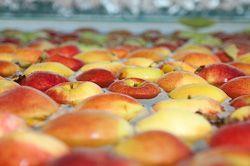
On the back of huge losses to the industry this year, New Zealand Braeburn apple exporters will likely sign a code of conduct to facilitate a more coordinated approach to marketing the fruit abroad.
The Nelson Mail reported the agreement would target problems resulting from too many exporters without prearranged supply orders competing to sell too much unsuitable fruit into markets that were already oversupplied and depressed.
Returns this year saw some growers receiving just NZ$9 (US$6.70) a carton, while the average price of NZ$17 (US$12.60) was still below the NZ$20 (US$14.90) cost of production, the newspaper reported.
Pipfruit NZ chairman Ian Palmer said the proposal would involve coordinating the correct volume of the right sized fruit to send to each market. This would likely result in more fruit, particularly bigger sizes, being processed to make juice and apple slices, he added.
Following meetings over the last two weeks Mr Palmer told the newspaper he was confident at least 95 per cent of New Zealand Braeburn apple exporters would take part in scheme.
“There might be one or two traders out there who don’t see any point in being part of it, but will probably adhere to the principles anyway,” he told the newspaper.
“I’m absolutely confident it will be in place for the coming season, it has to be.”
Pipfruit NZ chief executive Peter Beaven told the newspaper the agreement would require that exporters share information and market the fruit using the 100% Pure brand.
“Based on information that we give them, growers will make calls on what they pack and where it goes in collaboration with the exporter of their choice.”
He added that growers would be responsible for using exporters who acted responsibly and adhered to the specifications of the accord.
The New Zealand Braeburn crop this season is expected to jump to 4.5m cartons, up from 3.6m cartons last year. It is forecast the market will handle just 3.4m cartons.
Mr Beaven told the newspaper there was an understanding in the industry measures must be taken to better manage the country’s Braeburn crop.
“There is no perfect solution but this `proposed agreement` is as close as we can expect to get and I think it has the potential to deliver what we require.”
Growers of the Jazz variety are also looking at ways to increase their profits as they face a loss of NZ$5 (US$3.70) a carton this year.
At a meeting cheered by Mr Palmer a group of around 40 growers have decided to form an association to provide representation in their dealings with Enza, which owns the marketing rights for the variety.
Many growers have gotten the pip over the cost of marketing the variety and the royalties they pay to Plant & Food research, which developed the variety.
Mr Palmer said the association would likely approach Plant & Food Research and request it reviews the rate of royalties it collects from the sale of the fruit.
He told the newspaper that the association would also look at better managing foreign exchange risks and educating growers on producing the right size and volume of fruit at a lower cost.



